First things first
I'm fine and have made my peace with my spring A-race, the Hannover Marathon. Today is Monday, so one day was enough. I'm impressed with myself. Because right after the marathon I was a bit angry. Or rather, disappointed. And a little baffled. All three, actually. The reason: Unfortunately, my old problem, a lack of physical race readiness, caught up with me again.
Hello old friend
For those who don't know what I mean by "lack of physical race readiness", it's the "interesting" phenomenon that, from the first kilometer on, my heart rate in A-races is about 15-20 beats above the value that training or comparable problem-free races would suggest(*). I have been trying to get to the bottom of this problem for 6 years, most recently with daring experiments in tapering. Unfortunately, the Hannover Marathon showed that I am still far from finding a solution. But one thing at a time.
I ran (a high) 3:03 in Hannover. A great result. In fact, it was the third fastest marathon of my life. Just a few months ago, when the marathon and I became friends again, I would have jumped for joy at a time like that. Unfortunately or fortunately, the 2:57 in Rodgau in January showed me that I still have a bit more marathon potential in me than my previous, long-standing PB of 3:03 from 2018.
I wish I could cut this race retrospective short with something as simple as:
"I was poorly trained and burst at 25K."
But sadly that's not true.
In reality, it was 16 weeks of great, extensive and demanding preparation, without getting sick, without getting injured. This almost perfect training had given me hope and confidence that I could repeat the sub-3 on the road. After all, road is faster than dirt. And 12 weeks of additional training, which is how much time my coach Karim and I had after Rodgau to get fit for Hannover, usually leads to an increase in performance, not a decrease, unless you are overtrained. But I wasn't. Quite the opposite. I felt fit as a fiddle right to the end of the training cycle and conjured up even the toughest training sessions on the asphalt like Da Vinci painting the Mona Lisa on a canvas. Okay, I'll get myself together now, back to the topic.
Hannover effort and pace
I ran Hannover the way you typically run a road marathon. For me this is mostly in the 5/10 - 6/10 (RPE) effort range, heart rate (which I only check after the race) 150 - 165. Unfortunately, the actual pace didn't match that effort and heart rate at all. Not in the slightest.
I didn't have a specific marathon pace in mind, I ran by feel again, but with an average of 4:20 min/km and some noticeably weak kilometers down to 4:40 min/km, I definitely wasn't in the range I was expecting.
The urge to stop
Of course, having such a high heart rate right from the start also means that your body tires earlier in the race. So the first time I felt like stopping was at 25K already. I tried to manage this with a simple rule: You can slow down, but you must not stop. Sounds plausible under normal circumstances. After all, it doesn't make sense to just stop and then trot off again. It feels just as bad after 2 minutes as it did before. Stopping is only "worth it" if you drop out and call it a day. But I didn't want to do that. No way.
So the struggle was real. Although my effort had increased from 6 to 7 (in bpm this happens to me at about 163 bpm heart rate) and 7/10 is half-marathon effort for me, I was getting slower and slower. It's hard to keep your #S together in a situation like that.
Attempted explanations
I have already written in another Das Z Letter about the often suspected reasons why this happens to me in (unfortunately too) many races: mental issues or overtraining. I can rule out both for myself.
The bottom line is that I'm still at peace with it, but after Rodgau and the Welser Half-Marathon, my coach and I really thought we were on to something. The assumption was that tapering could be responsible for the body "falling asleep" and the lack of physical race readiness. So we just skipped it, even for the A-race in Hannover. I still think this works well for me, but we couldn't solve the problem once and for all. We'll have to go back to the drawing board.
Fortunately, I committed to 3 road marathons at the end of 2022, including decent preparations. I've only run 2 of them. So Karim and I have a mission for the fall or next spring.
External Factors
It's important for me to separate the things that are wired wrong inside of me from the external factors. It wasn't all bad in Hannover. Quite the opposite. It would be far too easy to blame the result on external factors. But that's not how I work. I want to get to the bottom of things. Understand them. Understand me.
I want to get to the bottom of things. Understand them. Understand me.
So here's a list, separate from the first part of Das Z Letter, of the external factors that favored the marathon and those that didn't.
Favorable factors
Good mood. Yes, I was in a really good mood. I generally am, but the whole weekend was super relaxed (maybe too relaxed?) and I wasn't nervous or anxious regarding the marathon at all.
Good sleep. I slept really well the whole week. It's not as important for me as it is for others, but it definitely helps.
Good food. Yeah, okay, maybe a little much, but not stressing about food is better than treating eating like a life or death military operation. It's not.
Great event. Superbly organized. Everything is hassle-free and easy going, from picking up your bib to getting to the starting line. And the course is fast. Incredibly fast.
Lisa. Having Lisa by my side leaves me with a warm, fulfilling feeling and gives meaning to everything I do. Always. Even when I slurred at her at kilometer 35 that I’m fine and that I have all I need. That was a lie, by the way.
Mantras. My prepared mantra " Focus – Feeling – Patience" got me through the first 15 kilometers very well. But when the race finally got away from me, I had to switch to a more radical mantra, which fortunately came to me spontaneously. It was:
"Just me."
A real cave-in mantra. No input, no output. Total suppression of all feelings and thoughts. Not a nice mantra and extremely exhausting. But it was my only chance to finish the race.
Not so favorable factors
The temperature. Yes, it was "only" 13 degrees, but my body is at its best between 0 and 5 degrees. 13 degrees isn't a disaster, but it does have a tangible impact.
The wind. I don't know if the pros were itching too, but it felt like we had a constant headwind. Sometimes a crosswind. Actually pretty cool, only the Alphafly (clownishly large shoe made of foam rubber) is really susceptible to wind and almost blew me off my feet a few times.
Self-catering. Didn't work out. Too late for the drop-off. What time was the deadline? No one knows. It wasn't on the website or in the downloadable PDF. I improvised and ran the marathon with a bottle of Fruchttiger in my hand, which Lisa exchanged for a full one every 10km.
The 3-hour pacer. Even though I knew intuitively that I was far behind a sub-3 pace, it was a mental blow when the 3-hour pacer passed me at what felt like a hellish pace. Just to make sure I couldn't go any faster on the last few kilometers, I tried to hold on for a second. My pulse immediately shot through the roof and my eyes went black. I've probably run races before where I didn't want to run faster. But on this day, I just couldn’t run any faster.
The bottom line?
I find this is a nice conclusion:
I couldn't have run faster that day.
There's a little disappointment in that, but also a little pride. Just before I went to bed, my wife Lisa said to me:
"You did a great job today. The fact that you finished the marathon despite your struggles was a really beautiful gesture towards running."
Her words really touched me.
Insightful photo gallery



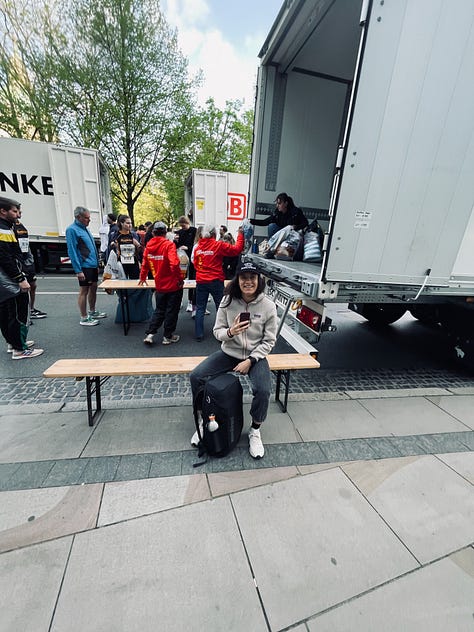
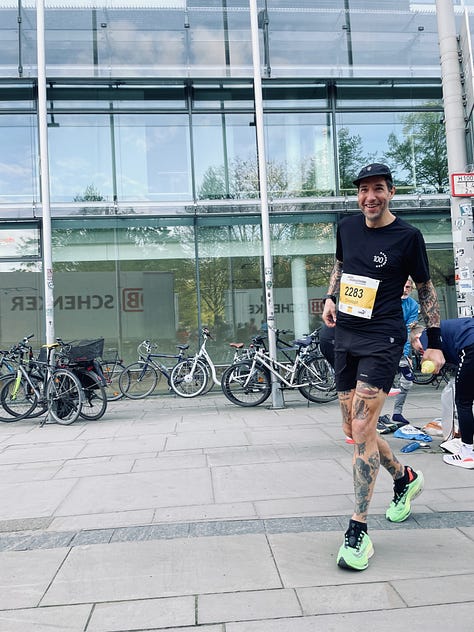



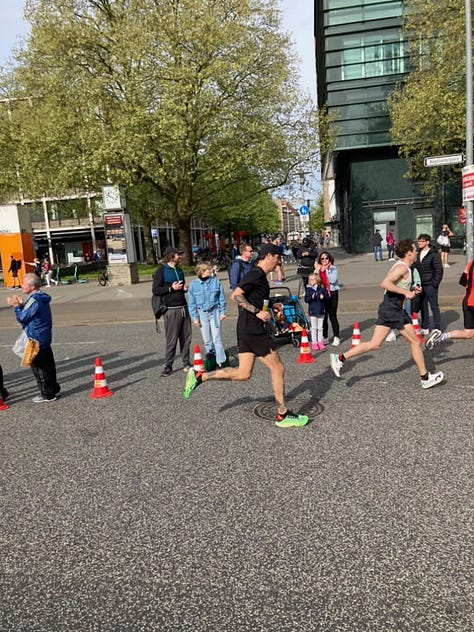
(*) The Levelhead’s Nerd Section
To put some numbers to this, here are some meaningful training sessions that can be used to draw conclusions about marathon performance:
Third of three 3000m intervals: Heart rate 161 at a pace of 3:42 min/km
Second of two 5000-kilometer intervals: Heart rate 162 at a pace of 3:55 min/km
Long run tempo block KM 25 - KM 30: Heart rate 157 at a pace of 3:57 min/km
Half-marathon Wels (B-Race): Heart rate 162 at a pace of 3:57 min/km
And these are not the "highlights" of the whole training block, but just random examples from the last 3 weeks.
The Hannover Marathon for comparison:
Already after 5 conservative kilometers in 4:12 min/km heart rate over 160
Kilometers 20 - 30: heart rate 163 at a pace of 4:20 min/km
After that, even slower with increasing heart rate
Overall marathon: average heart rate 162 at a pace of 4:20 min/km
It just doesn't add up.






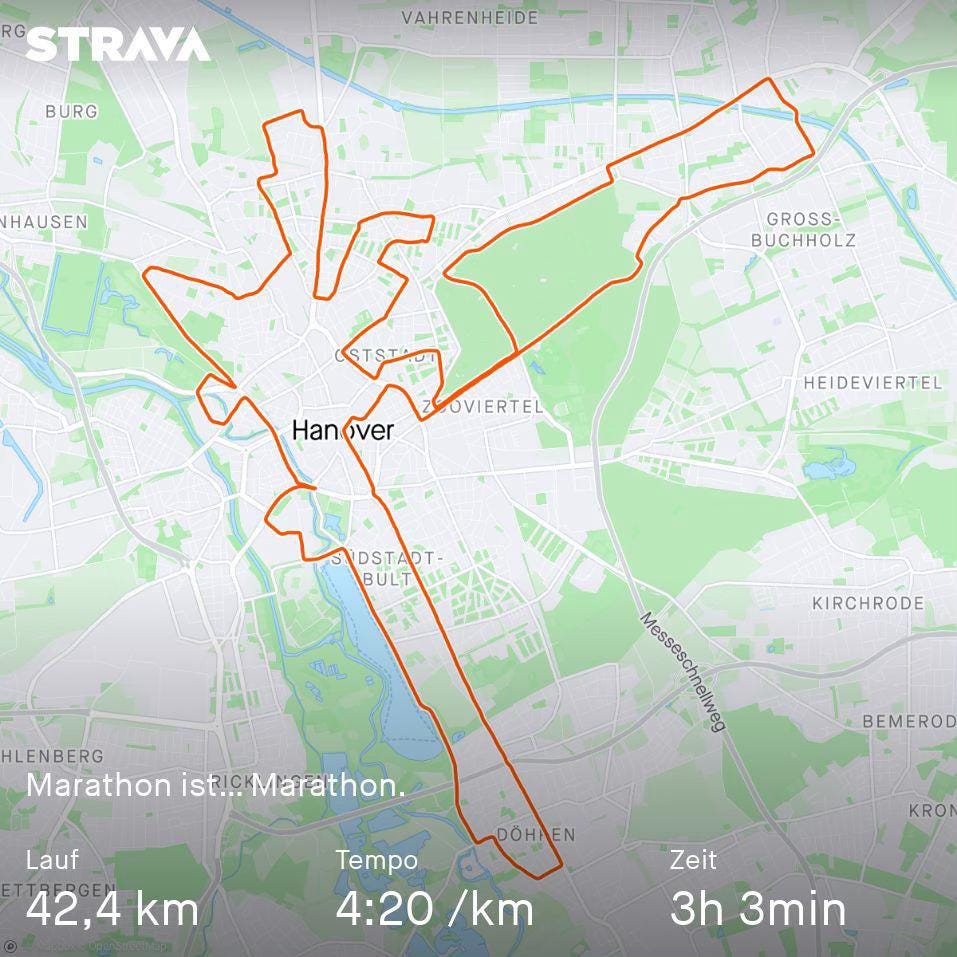

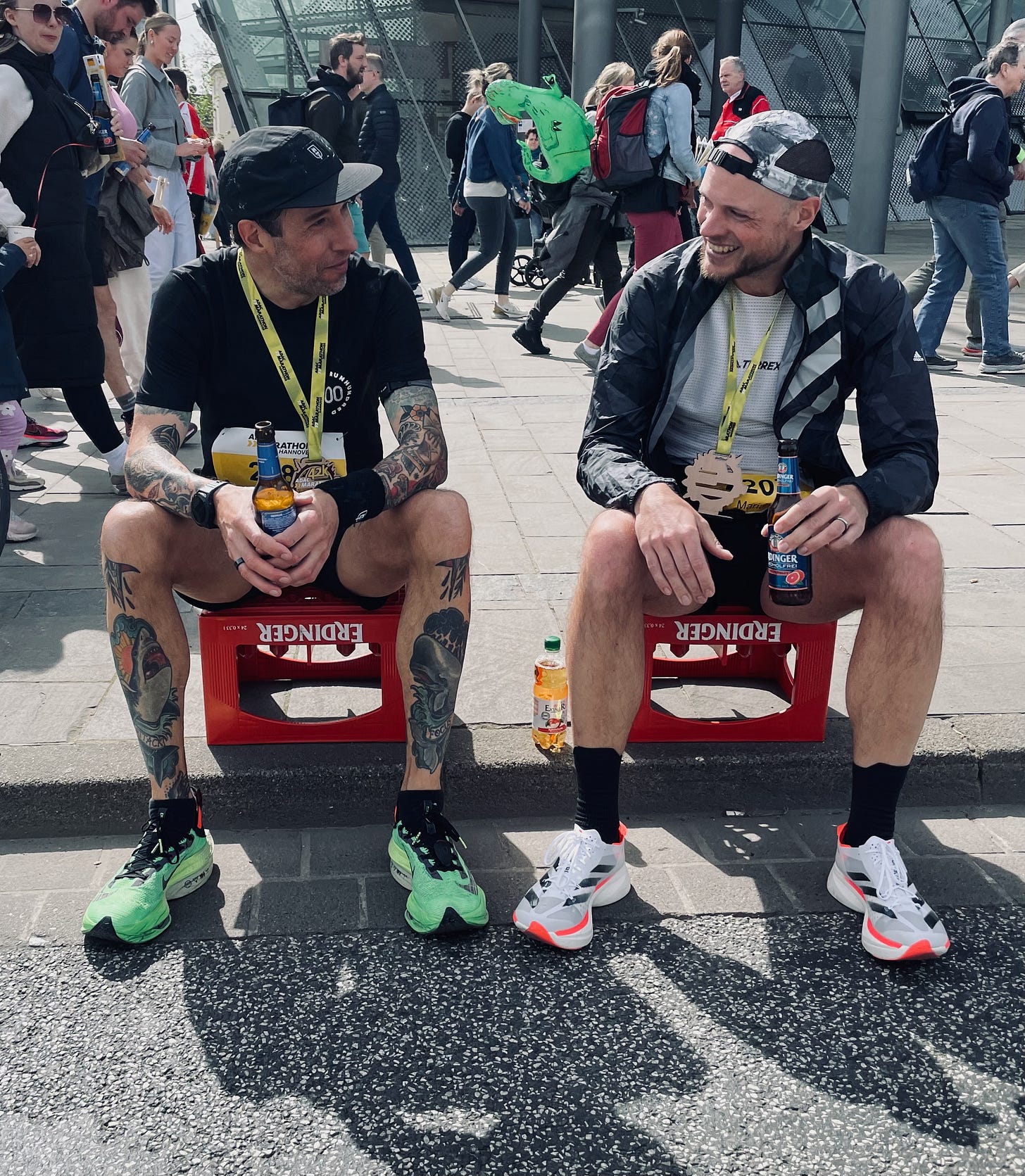
Your wife speaks the truth. We might not be happy with our races, but just finishing each and every time despite our constant reconcideration of life choices during the event is a win. Congratulations on finishing another marathon.
Wild guess: Maybe it's something similar to Leisure Sickness Syndrome. Intense marathon training (without getting sick throughout) = high levels of stress = constantly high cortisol. Tapering (physical or even just mental, as you wrote that you felt really relaxed in the past week) = drop of cortisol = increased succeptibility to infection = increased heart rate. Did you track your resting heart rate in the night before the race?